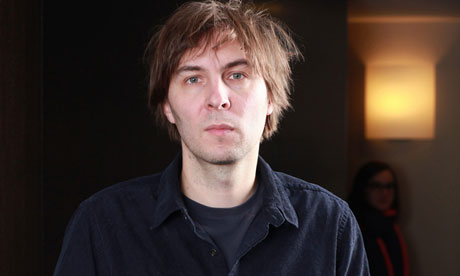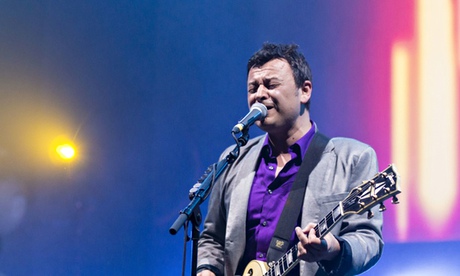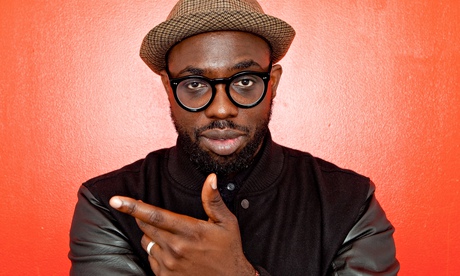Born in 1976, Thomas Mars grew up in Versailles and formed alternative band Phoenix with schoolfriend Chris Mazzalai in the early 90s. Joined by Mazzalai's older brother, Laurent Brancowitz, (whose previous band had disbanded, later to reform as Daft Punk) and Deck d'Arcy, the French four-piece released an English-language debut, United, to quiet acclaim in 2000. Mainstream success took a while, but three albums later, 2009's Wolfgang Amadeus Phoenix spawned the US chart hits 1901 and Lisztomania and won the band a Grammy. A new, fifth album, Bankrupt!, has just been released. Mars, now 37, lives in Paris with his wife, film director Sofia Coppola. They met when Mars recorded music for her debut film, The Virgin Suicides, and have two daughters.
MY EARLIEST MEMORY OF MUSIC
Jamais Content, Alain Souchon (1977)
My dad was in business and was somehow involved with a radio programme. This was a record that people were trying to push, I guess – so we had a stock of, like, 200 copies of it in the house, all these little 7-inch vinyls. I must have been really young, maybe four or five, and this is the first record I remember holding, playing it on the turntable. The title means "never satisfied", but that's quite a French trick – the title is sad but the music is uplifting. He's about contradictions, Alain Souchon. It's really well written, really special. The song was aimed at my parents' generation but something about the production – incredibly pop – made it seem child-friendly to me. At the time it wasn't even like music to me; I thought about it like a toy or something, I wasn't sure what it was. I just knew I liked it.
THE SONG THAT INTRODUCED ME TO NEW WAVE
Love Missile F1-11, Sigue Sigue Sputnik (1986)
My brother is eight years older than me. He spent a year in Seattle in the 1980s and came back with a bunch of vinyl records, and one of them was Sigue Sigue Sputnik's Flaunt It, which had Love Missile F1-11 on it. I remember hearing that song and it didn't sound like anything I'd heard before. And I loved it visually too; that was the first time I remember loving a record as an object. The cover looked like a Japanese cartoon – I immediately wanted it on my bedroom wall. It was music plus punk plus action heroes … All those things together.
THE SONG WE WERE TAUGHT AT SCHOOL
Ob-La-Di, Ob-La-Da, the Beatles (1968)
We [Phoenix] met at a school that was really incredibly strict, run by a sort of Nurse Ratchett figure from One Flew Over the Cuckoo's Nest. And this was in Versailles, which is like a museum. So rebellion for us – the concept was totally different. Everything you do is rebellious in Versailles. Everything you do disturbs the peace of that city, even playing the Beatles. The only Beatles song we were allowed to learn in school was Ob-La-Di, Ob-La-Da. That was all that was tolerated. All the kids were suggesting songs for the teacher to teach us, but if it wasn't Ob-La-Di, Ob-La-Da, it had to be Don't Worry Be Happy by Bobby McFerrin – over and over! Now I don't mind Ob-La-Di, Ob-La-Da. My kids love that song. So everything's reset. I don't think I was too badly traumatised by it.
THE TRACK THAT HELPED US BOND AS A BAND
No More Sorry, My Bloody Valentine (1988)
Our grades at school were terrible. We looked forward to Saturday nights. We'd rush to my parents' place and have two or three hours just playing music – that was the nice moment in the week. Even before Loveless came out [in 1991] I remember a My Bloody Valentine song from their first album [Isn't Anything], No More Sorry. It was more than music. It was contemporary art. A lot of things that we liked when we were kids, our parents would possibly like them too, or at least tolerate them. My Bloody Valentine? They wouldn't tolerate this band. And that was interesting. The music was noise, and it was disturbing, and it was something that helped us in the band as a bond. Us against the others – it gave us the feeling that we were part of something special, not like everybody else, which when you're a teenager you're always looking for.
THE RECORD THAT MADE IT IMPOSSIBLE TO WRITE IN FRENCH
Histoire de Melody Nelson, Serge Gainsbourg (1971)
Some amazing records have this power to leave you with inspiration, you're left with the urge to write something. And some records are totally overwhelming, because they are so good, they burn the bridges behind them. Like a Napoloeonic strategy. Gainsbourg's was one of those records. Everyone who's been writing French music since is struggling. It's the truth, it's horrible to see. Histoire de Melody Nelson is written so perfectly, he used the language so well, no one else can come after it. So awkward, so modern. The same level can't be reached again. Gainsbourg was the master and everybody's struggled since. That comforted us, as a band, that writing in English was right for us, even though when we took our first meetings with record labels, they wanted us to sing in French. But to copy that Serge Gainsbourg thing, 20 years after… We knew there was no way out of [the comparison]; you're not going to better him.
THE ALBUM THAT THREW US INTO A PANIC
Voodoo, D'Angelo (2000)
When you do your second album, everybody tells you: "Good luck with the second, that's a lot of pressure." And it's true. It's a moment when you have to rethink everything: either you do more of the same (and some bands do it great) or you choose not to go in that direction. We tried making music for our second album for a few months, and it was OK, but it was basically more of the same. And then [in January 2000] Voodoo came out. It took us eight or nine months just to recover from that. I hated the album cover! I couldn't relate to it – and yet the music was something I'd never heard before. Each song had a new trick. Just the drums… The way they played the drums, so unfamiliar. Voodoo was a huge record for us. The album had the coherence of Marvin Gaye's What's Going On, and that impact. It was totally overwhelming. We had to try to understand what it was about before we could go back to writing ourselves.
THE ALBUM I PUT ON TO UNWIND
Koyaanisqatsi soundtrack, Philip Glass (1983)
I remember going to a screening of Koyaanisqatsi [directed by Godfrey Reggio] and then getting Philip Glass's soundtrack afterwards, playing it over and over. It's nice because it doesn't make you think too much. When you need to be on auto-pilot it allows you to do so. The music, like the movie, makes you face something bigger than yourself – an overwhelming power. Which is a nice feeling, not to be able to control or change anything; especially when you're a musician and a control freak. When you're in the studio, for instance, working on a record every day for two years, it's nice to be able to put something on and abandon yourself. Bypass your brain, in a way.
THE SONG THAT GETS IT RIGHT ABOUT LOVE
Heart-Shaped Box, Nirvana (1993)
It's hard to talk about love without sounding either cheesy, or revealing too much personal stuff. To be honest, I wish we could write things that were more straightforward, that could talk about love in a more straightforward way. I don't know if it seems like it's been done in too perfect a way before – by Otis Redding, or by Al Green – or that we're just too shy. But there are two songs on our new record, The Real Thing and Chloroform, that to me are love songs; they just take a long pass to say "I love you". They take a giant detour! I don't think we could do it another way.
I read in a magazine about a lyric in Nirvana's Heart-Shaped Box. It pointed out that the song had a line, "I wish I could eat your cancer when you turn black", that takes the longest detour to saying "I love you". I can totally relate to that. There are people like Otis Redding who can sing I'm-so-glad-you're-mine stuff, with no shield. And then there are other songwriters who do the total opposite, and my band and I are part of that culture.











